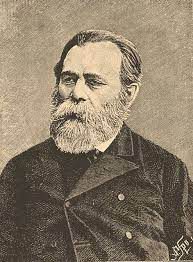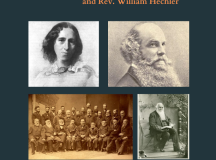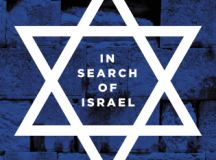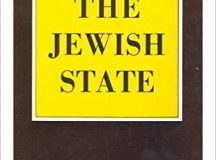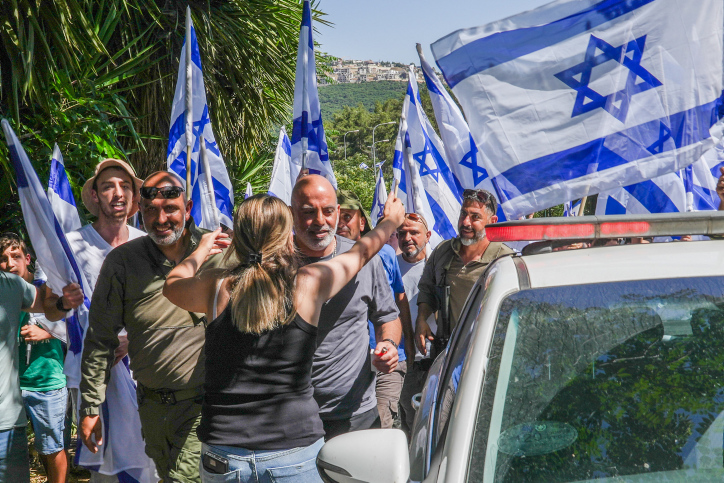Philip Earl Steele rereads Autoemancipation! author Leon Pinsker’s theory of antisemitism. Could our innate ‘fear of ghosts’ really be ‘the mother of Judeophobia’? Steele is the author of several Fathom articles on the early Zionist movement. His most recent book is On Theodor Herzl’s encounters with Zionist thought and efforts prior to his conversion in the spring of 1895, published in 2023 by the Polish Academy of Sciences.
The current global pandemic of anti-Zionism – one of antisemitism’s long-present mutations – calls for renewed examination of the durability, indeed the incurability of the ancient pathogen. And yes, tabling the matter in medical terms is my nod to the insight of Dr. Leon Pinsker, a 19th-century ‘father of modern Israel’.
In his foundational Zionist tract from 1882, Autoemancipation!, Pinsker offered a bold prescription for the Jews’ predicament – the creation of a Jewish polity. This is what captured attention, helped fuel the First Aliyah, and led to the formalisation of Hovevei Zion, the first Zionist movement. However, the doctor’s diagnosis of the basic nature of antisemitism was largely ignored then – as it is today. Even scholars (Netanyahu, Shumsky, Schoeps, Volovici, Schimmel) are leery, it seems, of repeating his term. Pinsker’s diagnosis – ‘demonopathy’ – is nevertheless altogether compelling.
Part 1: Who was Leon Pinsker?
In the wake of the pogroms that began sweeping the Pale of Settlement in 1881, Pinsker, a physician from Odessa, penned Autoemancipation!, publishing it in September 1882 in Berlin. The pogroms had erupted, as outbreaks of Jew-hatred typically do, during a time of crisis – in this case, one brought on by the assassination of Tsar Aleksander II in March 1881. Just as typically, the scapegoating of the Jews that ensued was delusional: the assassins’ organisation – Narodnaya Volya – was comprised primarily of Russians, although Ignacy Hryniewiecki, who lobbed the second, fatal bomb, was a Pole. The organisation’s sole Jewish member – Hesia Helfman – played a background role in the assassination. The facts, however, were pushed aside in the tumultuous rush to blame the Jews. Hence both the calamitous wave of pogroms – and the burgeoning number of Jewish groups that coalesced by early 1882, known collectively as Hovevei Zion, ‘The Lovers of Zion’.
For most of the 20th century, Leon Pinsker (1821-1891) was mistakenly claimed to have been an assimilationist rudely awoken by the pogroms. Yet as Dmitry Shumsky has shown in this century, Pinsker had long advocated for legal emancipation in Tsarist lands to be coupled with safeguards for the Jews’ identity as a people. Pinsker had even weighed Zionist ideas. In 1860-62 he was a leading figure with two short-lived Russian-language Jewish periodicals (Razsviet and Zion), contributing e.g., three favourable pieces to the latter on the Zionist efforts of the early 1860s co-led by Rabbi Tsevi Hirsch Kalischer of Toruń, Poland (then occupied by Prussia). In June 1870 Pinsker wrote for a third Russian-Jewish periodical – Den’ – about the pre-Islamic Jewish Himyarite kingdom in today’s Yemen. Notably, this article, with its evident Jewish nationalist theme, preceded Odessa’s Easter pogrom of 1871 by almost a year.
In early 1882, Pinsker was gripped by the tragedy of vast numbers of Jews being driven from their homes in Tsarist lands, often fleeing to the safe haven of Habsburg eastern Galicia. There in Brody and Lviv the many Lovers of Zion amongst the refugees were strengthened in their desire to press on to Palestine by such figures as the Zionist rabbi Samuel Mohilever and the Christian Zionist from Great Britain, Laurence Oliphant. Won over by the ‘correct instinct of the people’ in this ‘portentous flight’, Pinsker became convinced the moment had ripened for a systemic solution: the creation of a Jewish homeland outside Europe.
Part 2: Autoemancipation!, 1882
Pinsker was hardly a man of action by nature. With the remarkable exception of that spring and summer of 1882, he is aptly deemed ‘a reluctant leader’ (Evyatar Friesel), ‘a theorist … of little use when it came to practical work’ (Ahad Ha’am), one who ever had to be prodded (most importantly by Moshe Lilienblum) to exert authority within Hovevei Zion and conform his views to the movement. One explanation behind Pinsker’s overall hesitance is that his understanding of political realities did not permit him to believe Palestine would be available anytime soon for large-scale Jewish immigration. Events were to prove him right. Pinsker obviously left the option of ‘Palestinophilism’ open in Autoemancipation!, though the arguments he submitted there do recommend the United States as the best site for a Jewish homeland. For this reason, despite the fact he increasingly backed the choice of Eretz Yisrael over the next years, Pinsker is sometimes labelled a ‘territorial nationalist’, as distinct from a ‘Zionist’. One hastens to stress that the label not only neglects the evolution of Dr. Pinsker’s thought, but is applied selectively: Herzl, who at various times proposed Argentina, portions of the Arabian Peninsula, and most infamously Uganda, remains the unchallenged ‘Father of Zionism’.
But over the spring and summer of 1882, the retiring Leon Pinsker stepped out of his characteristic bounds, audaciously pursuing an international action plan of his own design. Specifically, he was determined to see his conviction of the urgent need to create a Jewish homeland prevail in direct confrontation with Jewish leaders across Europe. Thus, in March and April Pinsker visited Vienna, Berlin, Frankfurt, Paris, and London. His sole supporter came at that last stop with the British parliamentarian Arthur Cohen, who strongly encouraged the Odessan to publish his thoughts. Pinsker’s initial interlocutor was Vienna’s chief rabbi Adolf Jellinek, whom he had met in the late 1840s. Jellinek however sharply rebuked Pinsker’s plan, first to the doctor’s face, and immediately thereafter in several issues of the Viennese newspaper, Die Neuzeit.
Nonetheless, Pinsker soon started to draw like-minded persons. Rather unique among them was Rev. William Hechler, the Anglican priest who would become a prominent ally to Theodor Herzl. Hechler visited Pinsker in June in Odessa, insisting that his idea of creating a Jewish homeland was both sound and achievable. The Christian Restorationist furthermore insisted that the Holy Land was the only fitting place for an Israel restored.
Almost instantly upon the pamphlet’s publication in September, 1882, Autoemancipation! was translated from the German into Hebrew, Yiddish, and Russian. It was acclaimed by Vienna’s luminary of the Jewish national revival, Perets Smolenskin, in his Hebrew-language periodical Ha-Shahar. David Gordon in Ełk (today’s Poland) at once published Pinsker’s treatise in instalments in Ha-Magid, still then the most influential Hebrew-language weekly in the world. In early 1883 Yehudah Leib Gordon composed a poem about Autoemancipation!; in the preface to his own ‘autoemancipationist’ work of 1883, Rabbi Isaac Rülf ascribed inspiration to Pinsker – and Moshe Lilienblum in Odessa placed himself wholly at Pinsker’s service, with theirs becoming Pinsker’s closest partnership. Indeed, Lilienblum is foremost to be credited for Pinsker’s shift to ‘Palestinophilism’ – and his consent to shouldering a lead role in consolidating the Lovers of Zion into an affiliated body.
With Autoemancipation! Pinsker produced a highly trenchant and cogent treatise that included a passionate plea: ‘Let Now or never be our watchword [Jetzt oder nie sei unsere Losung]. Woe to our descendants, woe to the memory of our Jewish contemporaries, if we let this moment pass by … No sacrifice would be too great in order to reach the goal which will assure our people’s future, everywhere endangered. The financial accomplishment of the undertaking can in the present state … encounter no insuperable difficulties. Help yourselves, and God will help you!’.
Those final words of Autoemancipation! seem to anticipate Herzl’s ‘If you will it, it is not a fairy-tale’, the motto to his 1902 utopian novel Old-New Land. Pinsker’s closing passage as a whole suggests that the title of his pamphlet may have had an autobiographical ring: Pinsker had liberated himself – if only temporarily.
For just two years later, when Hovevei Zion convened what was the first significant international Zionist conference – held in today’s Katowice, Poland from November 6-11, 1884 – not only had Pinsker’s urgent tone vanished, but so too had his watchword changed. During the conference’s inaugural address he now proclaimed, Colonisation sei daher von nun an unsere Losung – ‘From now on, therefore, let colonisation be our watchword’. As Pinsker clarified, what he meant was aid for the already existing farming settlements of the First Aliyah, though he did make perfunctory nods toward a broader bid to foster a return to Jewish agriculture. Yet even here he pumped the brakes: ‘But what are a few generations for our imperishable people?’, before concluding anticlimactically: ‘By founding the Montefiore Association for the Promotion of Agriculture, especially for the support of the colonists in Palestine, we erect a monument to the jubilarian [i.e., Moses Montefiore, who had just turned 100], more everlasting than bronze, and we open a new path to happiness and true human activity for our people’.
Part 3: Demonopathy, or Fear of Ghosts: Pinsker’s Diagnosis of Antisemitism
Describing the innate ‘fear of ghosts’ as ‘the mother of Judeophobia’, the physician wrote:
Among the living nations of the earth the Jews occupy the position of a nation long since dead … The world saw in this people the uncanny form of one of the dead walking among the living. The ghostlike apparition of a people without unity or organization, without land or other bond of union, no longer alive, and yet moving about among the living — this eerie form scarcely paralleled in history … could not fail to make a strange, peculiar impression upon the imagination of the nations.
… Judeophobia is a form of demonopathy, with the distinction that the Jewish ghost … is not disembodied, like other ghosts, but is a being of flesh and blood … Judeophobia is a psychic aberration. As a psychic aberration it is hereditary, and as a disease transmitted for two thousand years it is incurable … Friend and foe alike have tried to explain or to justify this hatred of the Jews by bringing all sorts of charges against them. They are said to have crucified Jesus, to have drunk blood of Christians, to have poisoned wells, to have taken usury, to have exploited the peasant and so on. These and a thousand and one other charges against an entire people have been proved groundless … [Alas] against superstition even the gods fight vainly.
Shorn of the medical constructs typical throughout Autoemancipation!, the core of this diagnosis has in fact long been prevalent. After all, the traditional Catholic and liberal Protestant ‘replacement theology’ – whereby the Covenant was forfeited on behalf of the Church – exactly expresses Pinsker’s idea with its concept of a vagrant, accursed Jewish people. In his excellent recent essay in Mosaic, Gary Saul Morson approvingly quotes Aron Z. Steinberg to underline that the ‘messianic rivalry’ said to shape Russian/Jewish relations similarly posits a kind a supersessionism:
if … the future and salvation of the whole human race has been entrusted by Providence to Russia and Russians, then all these Jews still wandering the world are but historical dust (1928).
The otherwise outstanding historian Arnold Toynbee also lent credence to Pinsker’s diagnosis with his ignoble pre-WWII description of Jews as a ‘surviving fossil of an extinct civilization’. Toynbee’s post-war abhorrence of Israel was part of the same mental fabric. For how not to react with horror when the reprobate dead rise out of their coffins and assert themselves?
On the one hand, the Judeophobia arisen from demonopathy wishes to drive a stake through the heart of dead Jews and keep them buried, a real-world practice amply noted in early-medieval European cemeteries. Regarding living, breathing Jews, in turn, Dr. Pinsker argued that demonopathy construes them as zombies. So too, since 1948, has demonopathy construed their collective polity. And as anyone who has watched albeit a single zombie movie knows, there’s no sympathy when zombies are killed. Only the desperate wish for them to stay dead this time.
Demonopathy therefore sheds real light on the flailing, panicked attempts to plunge stakes through Jewish hearts. The freshest examples concern the contemptible reactions in diverse quarters to the atrocities of 7 October. The UN General Assembly, for instance, has yet to condemn Hamas – although within five weeks of the Simchat Torah Massacre it had condemned Israel with no fewer than eight stakes. This hardly looms as an anomaly when we flash on the UN’s past half-century, bookended by the resolution in 1975 to banish Zionism to the grave as racism – and the General Assembly’s 14 condemnations of Israel in 2023, with merely seven for the entire rest of the globe. There’s a loathsome, irrational fear of Israel operating here that unmistakeably hearkens back to Pinsker’s demonopathy.
By no means is this the outcome Leon Pinsker foresaw. Diagnosing Judeophobia as he did (reductively, with demonopathy the single cause), Pinsker’s prognosis was that transmission of the pathogen would be severed via the establishment of a Jewish state, as such a polity would both confer universal respect among the family of nations, as well as make ‘guests’ of the ‘ghosts’ hitherto dreaded in the Diaspora.
Part 4: Polish ‘philosemitism’ and 7 October: a contemporary case of demonopathy at work?
Antisemitism no doubt has differing causes in differing settings, and to what degree its varieties relate to demonopathy would take extensive exploration. For instance, what about the Muslim world? Anti-Zionism is certainly virulent there, with Jews being demonized and much being said about Satanic forces working through Israel (a ghost resurrected from the past). There likewise exists a brand of replacement theology in Islam. So, perhaps.
What about wokeism? As many onetime scoffers now realise, no small thanks to the notorious testimonies of the Ivy League presidents, wokeness is blatantly antisemitic and anti-Zionist. A revolutionary ideology, wokeism has divorced itself from liberalism, rejecting the focus on the individual, belief in progress and détente with religion – in favour of intersectional group identity, irredeemable sin and a bid to supplant religion. Like Voltaire, like the Bolsheviks, wokeists wish to sound the death knell for the truth claims voiced by the Hebrew authors of the Bible. The Awokening moreover evinces a programmatic impulse to sacrifice whole groups while raising others. But demonopathy? – perhaps not.
A stark case of demonopathy can be found across Central-Eastern Europe. For present not only in Poland, where I live, is the phenomenon of ‘antisemitism without Jews’. Strange on the surface, as here in the ‘Bloodlands’ of World War Two the huge Jewish population was virtually destroyed. Nonetheless, already in the immediate post-war years a deep-seated fear took hold: one of Jews coming back to reclaim homes and property, but equally to undermine the sense of victimhood, the martyrdom of the non-Jewish peoples rebuilding their countries. This soon became indistinguishable from a demonopathic fear of the dead returning to exact vengeance. Indeed, ‘medieval’ blood libel accusations also emerged, with spontaneous mobs hunting down Holocaust survivors and murdering them – as happened in Kielce in July 1946.
Today’s Polish discourse contains a wide range of passionately discussed topics. Every so often the Jewish topic is one of the loudest – most notably, in the period since the end of communism, when in 2000-01 Jan Tomasz Gross’ bombshell book Neighbors made all else pale. Another example is that of the US’s Justice for Uncompensated Survivors Today (JUST) Act of 2017, which caused a flare-up of demonopathy in Poland during the months preceding the required November 2019 submission to Congress of a report on the Polish state’s progress regarding restitution.
Naturally there are diverse institutional milieux – scholarly, religious and NGO – devoted year-round to things Jewish. As I have explained elsewhere, these groups and organisations consistently however reduce the vast topic of Jewry to the Shoah and adjacent episodes of antisemitism. Israel and Israelis are outright erased, and to such an extent that Am Israel Chai sounds subversive in Poland’s nominally philosemitic crowd.
These interlocking milieux operate in a way that (structurally, i.e., whether intentionally or not) assuages the existing demonopathic fears by forever hammering home that the Jews are dead – and (on the flip-side) by forever ignoring the reality of Israel, that phoenix from the ashes. Near-total attention is focused on the Nazis’ genocidal program (central locations of which – Auschwitz, Majdanek, Treblinka, etc. – are in Poland), on thematically-related museums and – at hundreds of local sites – the upkeep of Jewish cemeteries, something purported to involve 10,000 volunteers per year throughout Poland. Though neglecting the Polish case, Dara Horn highlighted this matter in her book from 2021 People Love Dead Jews: Reports from a Haunted Present. There Horn calls the ‘mania for dead Jews … deeply perverse’, adding that this ‘popular obsession with dead Jews, even in its most apparently benign and civic-minded forms, is a profound affront to human dignity’. After all, it excludes the story of Jewish rebirth, despite that story’s greater magnitude in the past millennium of the Jews’ history than any and all others save the Holocaust. And yet, with the exception of Płońsk, the hometown of David Ben-Gurion, ‘Jewish heritage tourism’ in Poland includes close to nothing that opens the door to life. There’s almost no commemoration of the numerous ‘fathers of modern Israel’ who hailed from Polish lands, among them: rabbis Tsevi Hirsch Kalischer and Samuel Mohilever; the press magnates David Gordon and Nahum Sokolow; prime minister Menachem Begin, Herzl’s ‘most beloved friend’ Leon Kellner, and Benjamin Netanyahu’s grandfather Nathan Mileikowsky. The epochal success in the re-establishment of a Jewish state in Israel after nearly nineteen centuries is expunged in morbid preference for gas chambers and gravestones.
Events following the heinous massacre of 7 October brought this perversion, this affront blindingly to the fore in Poland, where for years the media has covered self-styled philosemites, especially clergy and theologians, on pious circuits to Holocaust sites. Grim faces, even black robes in the heat of summer at Jedwabne, Auschwitz, Otwock… but are they truly mourning Jewish deaths? This question (long rhetorical for some) was answered resoundingly in the negative when many of these very people – e.g., from the Polish Council of Christians and Jews – found themselves ‘speechless’ and otherwise unable for over a month to mourn the mass murder of 1,200 Jews on 7 October and condemn the sadistic culprits. On 13 November the Polish Council did finally issue a condemnation of Hamas and express sorrow over the victims of its indiscriminate assault (nota bene, at the initiative of a Jewish member), although that very day the former head of the Council (a Catholic, now a regular member of the Council’s Board) published a votum separatum. In it he justified the silence, writing ‘we don’t pretend to be experts on the Middle East’, before nevertheless 1) suggesting the victims of the Simchat Torah Massacre were themselves, as Israelis, to blame for their fate, 2) stressing his wish not to have appeared to be supporting Prime Minister Netanyahu (though seemingly quite willing to risk the appearance of supporting Hamas), and 3) paraphrasing Hamas propaganda stipulating Israel’s propensity to commit war crimes. The echo in his words of kindred comments uttered by ‘decent Christians’ in the aftermath of pogroms, Kristallnacht and worse – ‘Yes, a pity. But you know: usury, deicide, ritual killings…’ – is deafening. Nor was his an isolated voice. Two weeks later, another member of the Council took aim at Israel with an article in a Catholic weekly that equated Israeli settler violence with Putin and his war in Ukraine (sic!), sang of the greater freedoms in Bantustans than the West Bank (claiming the latter enjoys democratically elected authorities), and so on, betraying throughout an ignorance of the simplest facts, as when he stated that the Jewish settlements on the West Bank are illegal in Israeli law.
First a silence speaking volumes, then aggressive anti-Israeli denunciations. This stake-in-the-heart reaction to the massacre of Jews on the part of Catholic members of the Polish Council of Christians and Jews – of all organisations! – reveals matters in a nutshell: even when victimised, today’s Jews are widely held blameworthy and demonized. Much as in the benighted past.
With friends like these… One flashes on Herzl opining that the (Gentile) Viennese Society for Combatting Antisemitism should ‘do us Jews one more favour and dissolve itself’ – and of course on Dr. Leon Pinsker, too:
These and a thousand and one other charges against an entire people have been proved groundless. They showed their own weakness by the very fact that they had to be trumped up wholesale in order to quiet the evil conscience of the Jew-baiters, to justify the condemnation of an entire nation, to demonstrate the necessity of burning the Jew, or rather the Jewish ghost, at the stake.
Lastly, one furthermore wonders how the Polish Council now stands with the Catholic Church’s hierarchy in Poland, which issued a powerful denunciation of Hamas on 18 October signed by Archbishop Stanisław Gądecki, president of the Polish Episcopal Conference (KEP), and Cardinal Grzegorz Ryś, chairman of the KEP’s committee for Dialogue with Judaism. The same goes for the Polish Council’s standing with its parent body, the International Council of Christians and Jews, which on 10 October released a strong statement of solidarity with Israel and condemnation of the ‘savage terrorist attack’.
An intervention – if not an exorcism – would seem quite necessary.
Bibliography
Reuben Brainin, ‘The Biography of Leo Pinsker’, The Jewish Voice, St. Louis, July 27, 1917, 5-6.
Moses Gaster ‘Pinsker’s Auto-Emancipation – A Jubilee’, in: Views: A Jewish Monthly, vol. 1, no. 1, London, April 1932, 17-25.
Ahad Ha’am, Pinsker and Political Zionism (1902), translated by Leon Simon, The Zionist, London, 1916.
Benzion Netanyahu, The Founding Fathers of Zionism, Balfour Books, Jerusalem, 2012.
Leon Pinsker, Autoemancipation! Mahnruf an seine Stammesgenossen von einem russischen Juden, Commissions-Verlag von W. Issleib, Berlin, 1882.
– (Polish translation) Samowyzwolenie, translated and with a lengthy introduction by Hela Wulkan and Albert Hochmann, Wydawnictwo ‘Hanoar’, Kraków, 1927.
– (English translation) Autoemancipation!, translated by D.S. Blondheim, revised by Arthur Saul Super, Masada, Youth Zionist Organization of America, Cleveland, 1935.
‘Protokolle der Delegirten-Versammlung der Chowawe-Zion. vom 18.—28. Cheschwan 5654 in Kattowitz O.-S. Abgehalten’, in: Ketavim le-toldot Ḥibat Tsiyon ṿe-yishuv Erets Yiśraʼel, Palestine 1919, 275-295.
Julius H. Schoeps, Pioneers of Zionism: Hess, Pinsker, Rülf, De Gruyter, Berlin, 2013.
Dimitry Shumsky, ‘Leon Pinsker and Autoemancipation!: A Reevaluation’, in: Jewish Social Studies: History, Culture, Society n.s. 18, no. 1 (Fall 2011): 33–62.
Dmitry Shumsky, Beyond the Nation-State: The Zionist Political Imagination From Pinsker to Ben-Gurion, Yale University Press, New Haven and London, 2018.
Leon Simon, Moses Leib Lilienblum, Cambridge University Press, 1912.
Jacek Surzyn, Antysemityzm, Emancypacja, Syjonizm: Narodziny Ideologii Syjonistycznej, Wydawnictwo Uniwersytetu Śląskiego, Katowice, 2014.
Marc Volovici, ‘Leon Pinsker’s Autoemancipation! and the Emergence of German as a Language of Jewish Nationalism’, Central European History 50 (2017), 34–58.
Period newspapers: St. James’s Gazette, Gazeta Lwowska, Gazeta Narodowa, The Jewish Chronicle, Yorkshire Gazette, Selbst-Emancipation.

